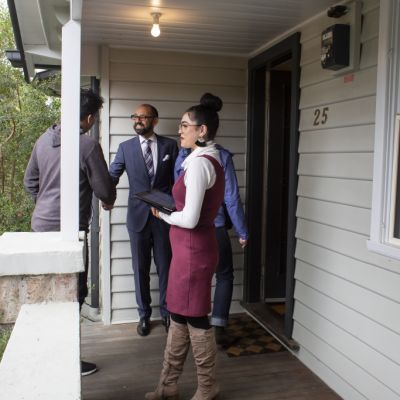How to buy the home you're renting from your landlord
For many renters, the time will eventually come to make the jump from tenant to home owner.
But if you simply love the home you’re already in; it’s possible to make an offer to the current owner to try to buy the home you’ve grown so attached to.
“Buying the house that you are renting is actually more common than most people would expect,” said PRD chief economist Dr Diaswati Mardiasmo. “[It’s especially common] when you are a family and you have settled in an area.”
“You could also be looking to purchase where you rent if you know that properties do not go up for sale often in that area.”
Purchasing your rental property might even work to your advantage, she said, as you already have a rental history and existing relationship with the agent.
“A good rental record will also assist with banks’ financing requirements,” Mardiasmo said.
So, if the house isn’t advertised for sale — and rentals usually aren’t — how do you go about making the initial move?
The simplest starting point is to contact your property manager.
“Advise that you would be interested in contacting the owner to discuss the prospect of making an offer to purchase the property,” said First National chief executive Ray Ellis.
It’s likely they will ask the owner, and if they’re interested, put you in contact with a sales consultant from the agency.
But making contact is the easy part – it’s the negotiations that can be daunting. If you’re the one making the initial contact, you’ll need to have an offer in mind, should the owner express interest in selling.
Be prepared
Sellers typically determine the value of their homes by obtaining appraisals from real estate agents, but this might not be the best option for tenants, says Scott Aggett, director of property negotiation agency Hello Haus.
Alternatively, he suggests arranging a valuation from an independent valuation firm, studying recent sales results and similar properties for sale to gauge the level of supply, and attending auctions in the area to understand the demand for properties.
“At this stage, you will have a good grasp on understanding market value,” he said.
Because buying the property you rent isn’t the norm, it’s important to have all of your ducks in a row before making contact, to avoid the process backfiring.
“The art is in the approach,” said Ellis. “If you are able to establish that the owner would consider an offer, you should put your offer in writing, and confirm that your finance is approved.”
“Your challenge is that because the property isn’t currently on the market, in some states of Australia the owner must have a contract of sale drawn up, which can take some time, making it difficult to secure your offer and commit the owner to selling.”
“Because the owner may not be ready to sell, even if you agree on a price, if there are any delays in exchanging contracts to consummate the purchase, news of the impending sale could leak, and that puts an off-market buyer at risk of being gazumped (someone else making a higher offer).”
If you aren’t pre-approved for a home loan, you can make your offer subject to finance approval. It’s also possible to make an offer subject to a satisfactory building and pest inspection.
Be certain
Before you dive in, be sure you have thought the decision through, Aggett said. “You may be missing out on a dream property elsewhere – if you don’t look, you’ll never realise.”
“It’s easy to get comfortable in a home and let laziness or a busy lifestyle kick in, and you settle for a property that isn’t perfect for your needs.”
Of course, you also need be sure that you’re ready to make the switch from renting to home ownership.
“Make sure you have the financial capacity to afford buying in the first place,” Aggett said. “Understand the additional costs that you don’t pay as the tenant, such as council and water rates, strata levies and home insurance.”
Once a sales contract has been drawn up, it’s wise to have it reviewed by a conveyancer, Aggett said.
“Be fair with your offer but remember it’s a negotiation. Be better prepared than the owner so you know the numbers and can negotiate from a place of knowledge.”
Buying your first home and don’t know where to start? Read Domain’s Ultimate Guide To Buying Your First Home.
We recommend
States
Capital Cities
Capital Cities - Rentals
Popular Areas
Allhomes
More










